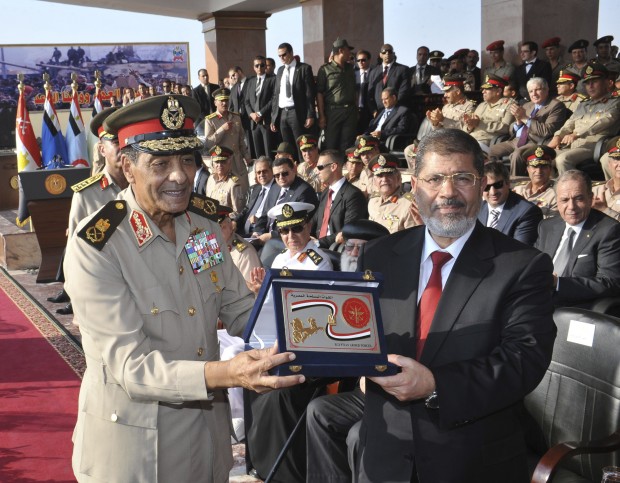
Egypt has finally taken its first step towards democracy, by electing Mohamed Morsi as president, following a long period of uncertainty and increased mistrust of the Supreme Presidential Electoral Commission (SPEC), fueled by their decision to postpone the election results.
Morsi’s victory represents a historical change, not only because, after 60 years of military rule, he is Egypt’s first civilian head of state, but also because he is the first freely elected president with a political Islamic background. Egypt’s presidential election results ended, against all odds and expectations, with Morsi winning by a narrow margin of 3 percent.
His victory, however, is hardly expected to bring immediate stability to the tumult Egypt has been facing since Mubarak’s ouster. Thus, he will find himself facing many challenges resulting from the divisions among the different political forces and outrage over the persistent security vacuum and deteriorating economy. Coming into the presidency after a long and exhausting transitional period will no doubt affect the president’s performance. The challenges he faces can be summarized in three categories:
Morsi and the Supreme Council of Armed Forces (SCAF)
It remains unclear how much authority Morsi will actually possess, particularly after the SCAF-issued decree stating that the president will no longer be commander-in-chief. This means he will not have the right to replace, appoint, or dismiss SCAF members, cannot declare war without SCAF’s approval, and cannot oversee the military’s budget. The president will also have no say in the formation of the Constituent Assembly in charge of drafting the country’s new constitution. Finally, the declaration gives SCAF legislative power until a new parliament is elected following the court ordered dissolution of the Muslim Brotherhood-dominated parliament.
The relationship between Morsi and SCAF will remain one of the most problematic issues the president will face. He may choose to maintain the peace and reduce tensions between the presidency and SCAF, a move which may come as a result of the latter’s apparent neutral stance in the presidential elections and evading all suspicions of fraudulent results. In that case, we could probably expect de facto limitations on Morsi and SCAF’s unlimited influence on the presidency.
On the other hand, he could press for a better balance of power, established by ensuring the cancellation of the June 17 decree, and the re-election of only one third of the parliamentary seats,as opposed to dissolving the entire legislative body, both of which weigh on the legitimacy of his presidential authority. If he can’t exercise these powers, he will not be able to implement his candidacy promises and he, and his cabinet, will be severely curtailed.
Morsi’s inaugural speech at Cairo University, however, does not bode well. In it, he praised SCAF for their management of the transitional period, saying that it had “honored its promise and pledge not to be a substitute for popular will”.
Morsi and the Egyptian Political Spectrum
Morsi doesn’t enjoy absolute support across the Egyptian political spectrum, with some having called for a boycott of the elections, and others who either voted against him or invalidated their votes. Liberal politicians, both those who distanced themselves from Morsi and those who expressed support for him are afraid that this support will in turn be used as leverage in negotiations with SCAF, disguising Muslim Brotherhood interests as national interests. Copts and women are also among those who fear possible civil rights violations, which could see them treated as second class citizens. Alternatively, those who voted for the so-called ‘Mubarak candidate’, Ahmed Shafik, do not necessarily support the remnants of Mubarak’s regime or even the Military Council. Their vote has, instead, been characterized as one that is fearful over Egypt’s struggled for democracy.
Morsi’s priority should be to allay these fears through the creation of a national unity government which includes women, Copts and liberals, rather than a government dominated by conservative political forces. This could possibly reassure them, particularly after his victory speech in Tahrir, in which he vowed to be president for all Egyptians, and following his decision to resign from the Muslim Brotherhood and the Freedom and Justice Party, as promised during his presidential campaign. If he fails to take these additional steps, he risks further disruptions and a persistently divided Egyptian political scene.
Morsi and Egypt’s Bureaucratic Institutions
A third challenge Morsi faces is a struggle to control the levers of the state’s bureaucratic institutions that the outlawed Muslim Brotherhood have long been banned from. Those institutions, including the state media arm and other sovereign ministries were an integral part of Mubarak’s regime. For decades, these ministries have not entertained the possibility that they might be run by members of the Muslim Brotherhood, and as a result, they may resist dealing with Morsi, possibly leading the country from one crisis to another. This could also undermine his planned reform initiatives for these institutions.
Morsi may find himself stuck between two options; he can either confront those institutions, and their labyrinth of state networks, or he can adapt to the situation by giving in to them, resulting in little or no reform.. That said, he should avoid clashes and attempt to implement structural reform, establishing amicable relationships, particularly within the Ministry of Interior. This will go a long way toward preventing a feared mutiny, which could prolong or even worsen Egypt’s security vacuum.
How Morsi handles these challenges could be a strong indicator not only for his success as president, but also an indicator of the success of the Egyptian revolution. He must create a prosperous, progressive, inclusive and modern Egyptian state that is in keeping with its people’s aspirations. If he fails to do so, the Egyptian people will lose far more than what the Muslim Brotherhood has lost in terms of its popular support.
Photo Credit: AP
Image: Morsi%20Tantawi.jpg
